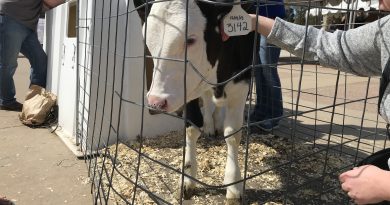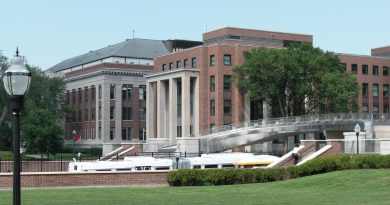Faculty association launches initiative with outstate Minnesota
A group of faculty members across University of Minnesota campuses are working to address political and geographical divisions in Minnesota, including a perceived rural-urban divide that they believe could impact campus and classroom life.
The Academy of Distinguished Teachers, a forum of teachers made up of recipients of the Horace T. Morse – University of Minnesota Alumni Association Award for Outstanding Contributions to Undergraduate Education, is currently developing an initiative to create new connections between the conservative and rural communities – starting in the classroom, but extending, they hope to the rural locations that send students to the university.
The ADT creates an initiative every two years. Its last initiative resulted in a series of recommendations to faculty on how to deal with student mental health and stress in the classroom.
The idea for this latest initiative came out of an ADT retreat in Brainerd: In September 2018, the membership decided on a twofold goal: to reach out to Greater Minnesota and beyond, and to foster respectful classroom engagement, said Chris Bremer, the coordinator for faculty awards in the Office of Faculty and Academic Affairs.
The ADT formed two groups to combat the issues that rural students face on campus. “Bridging Communities – fostering respectful engagement” focused on campus climate and “Conversations and listening across Minnesota” focused on reaching beyond the campus.
Bremer said one inspiration came from an NPR article detailing the experiences of rural students on campuses. The concerns included inadequate resources for rural students coming to the university, a perceived inability to voice opinions or concerns, and financial barriers.
Loren Dauer, a senior studying political science on the Twin Cities campus, said the initiative sounds like it could be a “step in the right direction.” Oftentimes, the campus takes a liberal perspective in the classroom because the conservative one is less popular, Dauer said.
“It would be good to see,” he said of the initiative. “I think conservatives will notice the effort.”
One part of these ADT initiatives is outreach to Greater Minnesota. The university has struggled to connect with rural communities in recent years, Bremer said, as many view the university as “monolithic and irrelevant,” Bremer said, who added that the university has struggled to connect with rural communities in recent years.
Phillipe Buhlmann, a chemistry professor at the university, said this is partially due to the university’s poor communications skills. Buhlmann said he believes the administration gives an elitist “ivory tower” impression and may be out of touch with rural Minnesota.
Buhlmann said that there is an idea that UMN faculty are trying “propagate their views” as left-leaning instead of focusing on research and fact. He wants to reinforce the university’s image as a research powerhouse.
Buhlmann hasn’t taught undergraduate classes in recent years. However, he said he notices the extreme polarization on campus — that “you would have to be living under a rock to not take notice,” he said. Buhlmann pointed to the controversial venue change of conservative speaker Ben Shapiro in February 2018, as well as debate about the university’s new gender pronouns policy, as tangible evidence of this polarization.
In an effort to address campus climate and to foster civil discussion in classrooms, ADT solicited the help of Bill Doherty, a professor of family social science in the College of Education and Human Development. Doherty, a former couples and family therapist, recently trained members of ADT on how to handle in-class confrontations.
During a lunch in February, Doherty ran through exercises with ADT members. Doherty divided people into groups and asked them questions such as, “What do you think the other group thinks about you? What prejudices do they hold? Is there any truth to them?”
Previously, Doherty helped to develop and found Better Angels, a program devoted to decreasing polarization across communities. Better Angels visits communities and offers skills workshops on how to have conversations with people with whom people disagree politically.
Bulhmann said this caused a lot of self-reflection on the group and spurred uncomfortable questions that challenged faculty members.
His only reservation in the exercise was that it breeds an “us versus them” mentality. In other words, it spreads the notion that people can only exist on one side of the spectrum.
“People are more multifaceted than that,” Bulhmann said.
The overarching goal of the ADT initiative is to make sure people of varying backgrounds and experiences feel welcome on campus. Buhlmann wants to combat the assumptions that people partake in a specific ideology because of where they grew up.
If the university wants to increase outreach in Greater Minnesota, Buhlmann said, then “we need to know ourselves and talk to each other, before we start talking to anyone else.”


